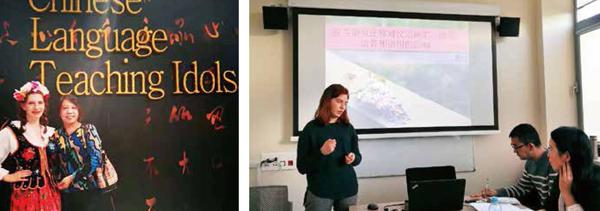遇见汉语,遇见最美好的自己
刘俏言
来自21个国家的28名汉语爱好者,9月汇聚在浙江工商大学,青年汉语家研修计划(杭州)在这里开班。这次活动由文化和旅游部主办,浙江省文化厅、浙江省社会科学院、浙江工商大学共同承办。
这些有着不同肤色、不同学历的研修者,因为“汉语”这个共同的爱好聚集在了一起。他们观赏西湖、考察历史,在深入学习汉语言文化的同时,也续写了属于他们各自的“中国故事”。
苏尔就是这个研修班中的一员。这位来自波兰的女生在大学时开始研习汉语,自此,一扇大门向她敞开,里面是她从未见过的世界。
“如果来到中国是偶然,那么回到中国就是必然”
如果非要找一个学汉语的理由,那或许就是她“喜欢挑战高难度”的性格使然吧。苏尔是这样说的。
在采访之前,汉语研修班的负责人一度担心她是否能够和我无障碍地交流。她抬起双手,耸耸肩膀,用略带山东口音的普通话对他说:“没啥问题,你放心好了,我可以的。”
落座后,苏尔笑着和我打招呼,对于中国惯用的开场白和客套显得无比了解和熟络。而事实上,直到上大学,苏尔才开始接触汉语,在此之前,她只是波兰的一个“很有语言天赋的小孩”。
没错,苏尔从小英语就很好。在高中,旁人还在学英语的时候,苏尔已经开始研究西班牙语,并取得了不错的成绩。高中毕业之后,不满足于只掌握两门语言的她,开始思考要不要去挑战一下众人口中“极其难懂”的中文。
“一开始就说喜欢是不可能的。”苏尔摊了摊手。习惯了符号语言的学习模式,骤然接触数量庞大的汉字,给苏尔带来了很大的压力;音调、平仄的变化,更是让苏尔一脸茫然——“真的好难啊。”这话,苏尔对我说了四遍。
转折在大三那年,苏尔拿着孔子学院奖学金来到山东烟台。负责人在向我介绍苏尔的时候,着重提到她曾在中国的一所大学交流,但提到具体的名字时明显卡顿了一下,苏尔在旁一直提醒着“鲁东大学”。对于苏尔来说,鲁东大学早已是她在中国的家。
“烟台不是一个很大的城市,但是在这里我的中文学习得到了质的飞跃,最重要的是我结识了那么多善良又温暖的老师。”苏尔告诉我,令她最为感动的是鲁东大学文学院院长胡晓清教授。正是她,坚定了苏尔来鲁东大学读研的想法。
一年的交流期結束,胡教授主动找到苏尔:“如果有可能的话,我希望你能回到中国继续读研。只要你愿意,这里永远是你的家。”凭着这句话,直爽的苏尔便确定——大学毕业后,直奔烟台。
如果说初来中国的苏尔是一次偶然的尝试,那么再回中国,苏尔就是抱着攻读更深层次的汉语的决心。
“研究生这两年,我是和丈夫一起读的”
异地恋,对每对情侣来说都会是一种考验。还好,苏尔遇见了一位和她一样热爱中文的男友。
苏尔不在波兰的第一个圣诞节,她的男友飞到中国来看她。那是他第一次到中国。那时的他或许没有想到,自己会因为女友的热爱而和这个国度相连。交流结束后,苏尔告诉那时还没有中国名字的男友,自己认定了中国,要再去中国读两年硕士。
和一般电视剧里撕心裂肺的分手桥段不一样,男友先是跪下来向苏尔求了婚,然后告诉苏尔:由于我受够了异地恋,所以我要陪你去中国,陪你读书,和你一起学你热爱的中文。为此,他向苏尔“要”了一个中文名字——苏宇乐。苏尔说,因为希望男朋友每天都快快乐乐的,所以起了“乐”,苏则是两人共用的姓氏。在询问了她的中国导师后,又在中间加了一个“宇”字。或许这就是所有女孩儿所憧憬的爱情吧:想你所想,爱你所爱,陪你长大。
就这样,在波兰举办完婚礼,两个人以夫妻的身份再次回到了鲁东大学。
很显然,这对夫妻的出现会给学院里的老师们添加不少乐事。他们会比较两人的功课,会调侃两人在一起学习时的腻歪。但这不妨碍老师们给他们送上的祝福——在中国,苏尔和苏宇乐又举办了一次婚礼,参加者都是学院的老师。
有相爱的人陪伴,两年的中国生活过得尤其美妙。苏尔告诉我,他们曾经一起特意买了从昆明到烟台的绿皮火车,为了见识到真正的“普通民众的生活”。看到一个孩子很喜欢动车模型,便买来送给他,“那个孩子高兴坏了,看他那么开心,我们就更开心了。”
这期间,苏尔还去北京参加了“汉教英雄会”的比赛。为了不给她带来太多的压力,带队的老师带着她在北京到处溜达。但是为了不辜负老师对她的付出,苏尔还是暗暗地下决心,一定要拿一个靠前的名次。最终,苏尔从700多名参赛者中脱颖而出,获得了八强的好成绩。
问及北京带给她印象最为深刻的事情,她笑着回答说:“五道口的一家云南菜特别好吃,那是我吃过的最好吃的中国菜了!”
吃中国菜,喝热水,泡茶。这三样已经成为苏尔来到中国后养成的习惯。每到一个地方,苏尔都会收集当地的特色茶叶,来到杭州也是如此。她告诉我:“还没喝到正宗的西湖龙井,改日一定会去尝一尝。”
在讲这些的时候,苏尔显得无比放松。在我们邻桌有一只小猫,时不时地发出奶声奶气的叫声。这个时候苏尔都会下意识地回头,应和着猫咪的叫声。率真,可爱,这是每一个第一眼看到苏尔的人就会有的印象。但只要谈及专业领域的问题,已经是博士生的她马上换了一副严肃的面孔。
“我想建立一套体系,搭起波兰语和汉语的桥梁”
回到波兰继续攻读博士的苏尔,对于汉语开始有了自己的想法。在她看来,中文中的很多词语是不能够“直接翻译”的,如果硬要直接翻译出来,会驴唇不对马嘴,但很多外国人未必能够真正理解其中的含义。
她坦言,在波兰,像她这样精通汉语的人并不多见。于是她更希望能够通过自身的努力,让更多波兰人在学汉语时不像自己当初那么艰难。她试图建立一套体系,去搭建波兰语和汉语之间的桥梁,改变汉语在波兰人眼中难懂的形象,让汉语融入波兰人的生活。“希望他们能够深入地、完整地、正确地了解中国文化。”
苏尔已经开始这样去做了。她在波兰的一家汉语机构任教,教那里的小学生们识字。“我从最基本的汉字教起,告诉他们怎么读,怎么理解,带着他们做游戏,想尽办法多教他们一些。”苏尔认为,对于很多波兰人来说,声调是最难学的,所以一定要从一开始就抓起來。
如何看待汉学,如何将汉学变成一颗种子传向四方,这是这两天她一直在思考的问题。比如她会执着地与许多老师探讨“腾笼换鸟”和“凤凰涅槃”这两个成语的译法。“如果能用一些简单的汉语建立那些热词的定义,就会有更多学汉语的外国人了解中国现在的模样。”苏尔这样解释她为了两个词语四处求教的本意。
“汉语是打开中国文化的钥匙,我希望将这把钥匙传递给更多人。”苏尔笑着对我说。
Anna Maria Scroka –Gr?dziel was one of those from 93 countries and regions attending an annual seminar on the Chinese language held in September 2018 on the campus of Zhejiang Gongshang University in Hangzhou, capital of Zhejiang Province in eastern China. During the seminar, they did sightseeing around the West Lake, the most famous tourist attraction of the city, visited sites of historical and cultural interests, and engaged in cultural exchanges with each other, in addition to study sessions of Chinese language and culture.
Anna Maria Scroka –Gr?dziel, known as Su Er to her Chinese teachers and classmates and the Chinese people she meets, started to learn the Chinese language in her college years. A language genius, she mastered the English language while she was very young. She did pretty well in a Spanish learning course at her senior high school. After high school, she wondered if she should challenge herself by learning Chinese, which was extremely difficult in the eyes of many people around her.
She plunged herself into this ambitious task, but soon found herself bogged down in difficulties. She found that, unlike English and Spanish, the Chinese words looked impossible and Chinese pronunciation sounded tongue-twisting and jaw-dropping. The turning point occurred in her junior year at college in Poland when she received a scholarship from a Confucius Institute in Poland to study for a year at Ludong University in Yantai, a city in Shandong Province in eastern China.
She made incredibly fast progress in her Chinese language learning in Yantai. Moreover, she made friends with her teachers and classmates. Professor Hu, director of the Liberal Arts School of Ludong University, played a crucial role in her decision to take a postgraduate course at Ludong. The professor offered her an opportunity to advance her Chinese learning at Ludong. She accepted the offer.
If the scholarship came to her by accident or by luck, coming back to China was her career choice. And she came back with her husband.
In China she celebrated her first Christmas out of Poland. Her boy-friend flew all the way to China to be with her. It was his first visit to China. She said she would come back to China for a two-year postgraduate course after the one-year study expired. Her boy-friend, also a student engaged in Chinese learning, decided to join her at the postgraduate course at Ludong University. They got married and her husband got a Chinese name Su Yule.
The couple was a hilarious presence on the campus. The wife and husband competed with each other in their studies and they were sweet to each other. They held a Chinese wedding on the campus.
During their two-year study, they traveled a lot in China. Once the couple took a slow-speed train from Yantai to Kunming in the southwest to see how ordinary people of China lived and traveled. Also during the two-year study, Anna Maria Scroka –Gr?dziel took part in a competition in Beijing. She ranked among the top eight of over 700 contenders.
Now a PhD student back in Poland, she wanted to establish a system to connect Polish and Chinese. In her opinion, the actual meaning of many Chinese words gets lost in translation and foreigners wouldnt be able to understand these words if the words are poorly translated. She said her proficiency in Chinese was rare in Poland. And that was why she took it upon herself to design a system so that her fellow Polish people wouldnt find it so difficult to learn Chinese.
She has already embarked upon a special course, putting her system to practice. Nowadays she teaches in an education institute where primary school students are learning Chinese. “I start from the essentials. I instruct my students how to read a word, how to understand it, and I play games with them so that they can take Chinese in more easily,” said the ambitious young teacher. In her opinion, for many Poles, the most difficult part in learning Chinese is to read words in tones.
“Chinese is the key to Chinese culture. I hope more people can have this key and find the beauty of Chinese culture,” said Anna Maria Scroka –Gr?dziel.

